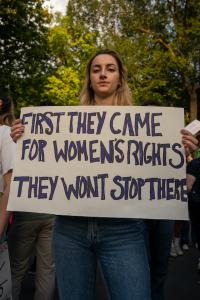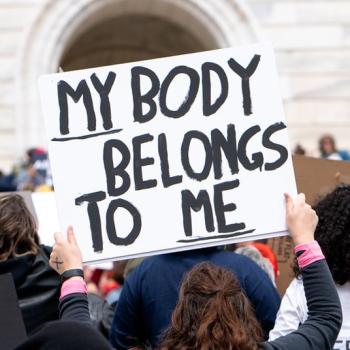“Everyone here needs to read R.J. Rushdoony. Get a copy of his writings and be blessed by them!”
Those eighteen words were spoken by my first church pastor. They were also my introduction to the church-based indoctrination of the Religious Right. I had been a Pentecostal Christian for four months; newly born again, and eager to learn. Growing up in a different church, I wasn’t a stranger to anti-choice rhetoric. I was, however, ignorant to a so-called standard Evangelical or Pentecostal viewpoint of issues. Assuming Christianity was as diversely opinionated as its many denominations (which it is), I made the assumption there was no singular viewpoint about abortion or contraception. Never being a fan of the 700 Club/Moral Majority/Focus on the Family approach, I figured others were also unimpressed.
It was a surprise to learn that many followed these figures without a second thought. Is abortion the central issue that many feel it is? When did it become an issue?

Where did this all start?
Contrary to belief, there are many different views about abortion and contraception among believers. We aren’t aware of this fact because there tend to be very loud voices that promote one-sided, uneducated politics in Christian circles. Some believe anti-abortion ideas and Christianity are one. In seeing the push for certain political viewpoints and policies, my question became: When did the “Right” become the “Religious Right?” In researching this question, I came to discover a convoluted world, both disturbing and pervasive.
The history of the “religious right”
Prior to the 1960s, Evangelicals were uninvolved in politics. Such was regarded as being part of the “world” and a distraction from Christianity. This didn’t change the fact that Christian conservatives and liberals had been battling it out for a number of years among themselves. Most notably, Christian Fundamentalism formed in response to the Scopes Trial of the 1920s. Still, the battle was more of an internal one, and there remained a definitive dividing line between church and politics. Enter R.J. Rushdoony, who we could cite as the philosophical founder of the Religious Right. A New Yorker born of Armenian immigrants, R.J. Rushdoony presented a new theology called Christian Reconstructionism.
Unique to the United States, Christian Reconstructionism advocates for harsh interpretations of Mosaic Law applicable for the nation’s citizens. Under Rushdoony’s proposed sanctions, the death penalty would serve as punishment for homosexuality, adultery, incest, lying about virginity, bestiality, witchcraft, idolatry, apostasy, public blasphemy, false prophesying, kidnapping, rape, and perjury. He was also a staunch advocate of segregation (including segregated marriages), slavery, and denied the Holocaust. While his viewpoints were not readily accepted, one group of individuals did accept his concepts: the bigoted southern right. Rushdoony’s ideas gained acceptance when others began writing and publishing similar viewpoints in the 1980s, as the Religious Right began to cite him as their philosophical founder.
In the meantime…
While Rushdoony was busy working on a falsified version of American history (conducive for Religious Right adaptation), Evangelicals were encountering issues elsewhere. In South Carolina, a man named Bob Jones was busy maintaining segregation in his university. In 1975, Bob Jones University nearly lost its tax exempt status as the school’s racial policies were in violation of the Civil Rights Act of 1964 (as per Green V. Connally). Green v. Connally was a 1972 Supreme Court case ruling racially biased non-profit segregation practices as uncharitable and ineligible for tax exemption. Bob Jones University endorsed racial segregation policies from its founding: African Americans were denied admittance until 1971, unmarried African Americans until 1975, and interracial dating was forbidden until 2000.
While Bob Jones filed suit and won his case in 1983 (under the Regan administration), the mere suggestion that Christian colleges didn’t have the right to discriminate was a bit much for him to handle. Thus, the Religious Right mobilized. Evangelical Christian leaders took this as an assault against their insular perceptions and began to assemble. Paul Weyrich (a Melkite Greek Catholic), had advocated to mobilize Evangelical voters since 1964. He wasted no time recruiting James Dobson (founder of Focus on the Family) and Jerry Falwell (founder of the Moral Majority) to the cause.
Abortion enters the picture
Before the Religious Right, Evangelicals didn’t care about abortion. They held the standard Protestant viewpoint that such was a personal matter, embracing the view that life began at birth, not conception. Thus, the majority of Protestants and Evangelicals were pro-choice after the passing of Roe v. Wade. Abortion didn’t enter the stage until post-1983 Bob Jones University victory. The top leaders gathered to discuss further strategy. Someone suggested the Religious Right could start a larger movement from their despicable origins. They took suggestions for other issues they could make their own, and a caller made the suggestion, “How about abortion?”
The rest is history.
Abortion and the Religious Right today
The Religious Right has spent four decades deceiving people, claiming anti-choice ideas are a cornerstone of Christian value and virtual. In actuality, anti-abortion measures are not the foundation of the Religious Right, nor Evangelical doctrine. Unaware of history, millions of professing Christians follow the direction of men who are both racist and sexist. While the Bible remains silent on abortion prohibitions, the Religious Right still treats abortion as its own “baby,” so to speak. The Religious Right’s main issue argues for the defense of life, while the organizational structure rests upon racial disestablishment. While the movement seems family friendly and interested in the “well-being of babies,” such is to distract from its true origins.
Abortion and the church
Abortion practices have been around since at least 1500 BC. As stated above, there is no prohibition on abortion or contraception in Scripture. If anything, there is a particular passage of Scripture that appears to induce abortion in a case of marital infidelity:
Numbers 5:16-22 (NIV):
“The priest shall bring her and have her stand before the Lord. Then he shall take some holy water in a clay jar and put some dust from the tabernacle floor into the water. After the priest has had the woman stand before the Lord, he shall loosen her hair and place in her hands the reminder-offering, the grain offering for jealousy, while he himself holds the bitter water that brings a curse. Then the priest shall put the woman under oath and say to her, “If no other man has had sexual relations with you and you have not gone astray and become impure while married to your husband, may this bitter water that brings a curse not harm you. But if you have gone astray while married to your husband and you have made yourself impure by having sexual relations with a man other than your husband”— here the priest is to put the woman under this curse—“may the Lord cause you to become a curse among your people when he makes your womb miscarry and your abdomen swell…”
“‘Then the woman is to say, “Amen. So be it.”
It’s obvious from this passage that in such a circumstance, a woman stood before God, herself. Others were not consulted to make decisions on her behalf. This sacred process wasn’t a means for interference. In such a situation, the woman’s privacy is relevant; the matter is between her and God.
Guardians of privacy
Abortion shouldn’t be used to cover up other matters of political interest. How a person votes, whether or not a woman has an abortion, or political ideas about how this country will best operate are private matters of individual conscience. They are certainly not the concern of a lobbying group, nor should they be so front and center in church. Instead, let’s not only respect privacy, but uphold it, as well. Being a Christian is about supporting choice and conscience, not defending the Religious Right. Let us uphold ours while respecting the choices and decisions of others, as well.


















